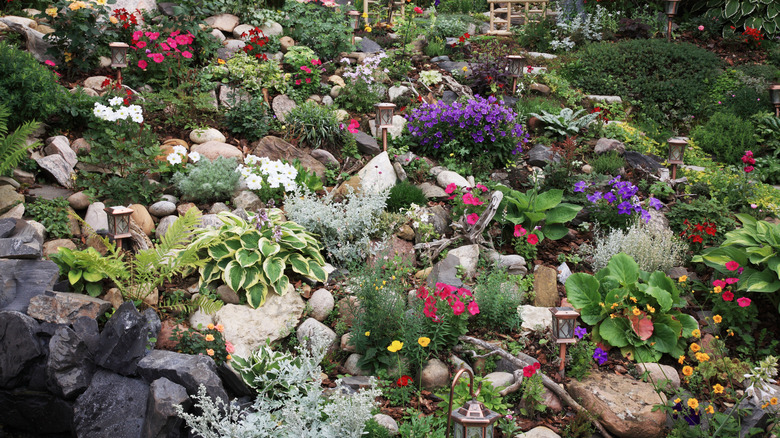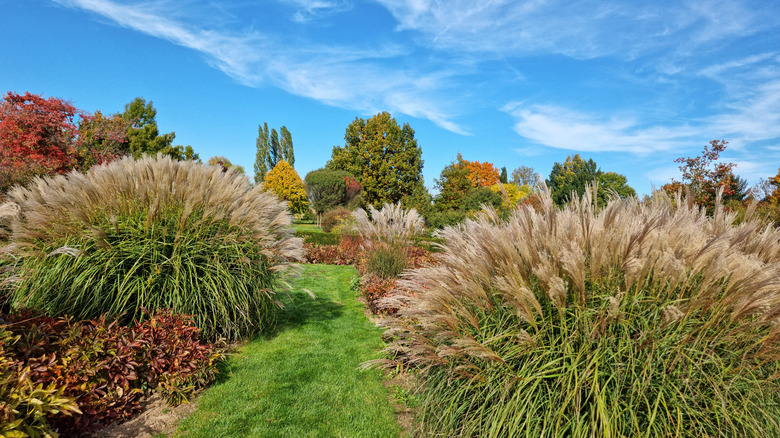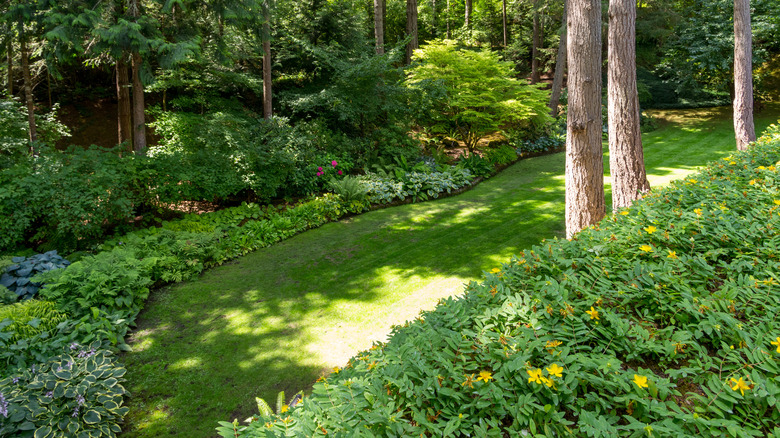The Most Ideal Plants For Your Sloped Yard
Sloped yards can present challenges, but they also provide opportunities for some beautiful landscaping. Whether you go for a terraced look, a winding path, a water feature, or simply some low-maintenance layered landscaping, there are many ways to make your sloped garden a point of interest while also ensuring the plants don't fall victim to gravity or erosion. The best plants to place onto slopes are ones whose roots spread out like a large blanket under the earth. These roots act like an anchor for both the plant and the soil. Luckily, these anchoring root systems are found on many different varieties of plants, from ornamental grasses and other low-lying flora to shrubs and trees. This provides unlimited landscaping ideas for you to choose from.
The soil itself is also susceptible to erosion and slough off, making thoughtful planting on a slope or hillside a priority of your landscape design. Research the best available options for your area and sketch out a basic planting map. Wet slopes will require different plants than dry ones. If your hillside is particularly rocky, you can plant around the rocks in pocketed landscaping and it will work just as well, or you can create a rock garden around your plants.
Ornamental grasses lay the groundwork
No matter what sort of landscape design you decide on for your sloped yard, ornamental grasses will fit nicely into it. As they range in height from as little as 3 inches to over 2 or 3 feet tall, they create visual interest against your other plantings. Varieties like red fescue (Festuca rubra) and switchgrass (Panicum virgatum) are particularly good for steeper slopes, whereas different types of zoysia (Zoysia japonica) — which have deeper roots — are more suitable for gradual ones. Consider one of several love grasses (Eragrostis) for areas prone to drought, whereas cloud grass (Agrostis nebulosa) and tufted hairgrass (Deschampsia cespitosa) both leach extra water out of the soil, making them better for areas with excessive rainfall.
Ornamental grasses can be planted on a slope from shortest to tallest for the most dramatic effect, whether or not you plant them around a trail or stream. In terraced gardens, slope-preferred plants are no longer a requirement but should be planted by height as well, with the tallest mature grasses at the top of the hillside and the shortest on the lower tiers. This method will naturally draw the eye up the length of the slope, causing the onlooker to take in all of the landscaping at once.
Trees, shrubs, and flowers create a natural display
If left without any care over hundreds of years, your sloped yard would naturally turn into a tree-lined grove. You can create this effect intentionally with a variety of evergreens and shade trees near the top of the slope, interspersed with various bushes and perennials as underplantings. Douglas firs (Pseudotsuga menziesii) and white oaks (Quercus alba) do exceptionally well on sloped ground. Depending on your local climate, you could also look at Monterey pines (Pinus radiata) and sugar maples (Acer saccharum). Planting a variety of shade trees and evergreens will create a yard that looks beautiful and interesting year-round.
Shrubs and decorative perennials will bring color and intrigue to the areas beneath your trees and can travel down the slope as well, with the shortest mature plants placed at the bottom of the hill. Look to beautify your yard with Arnold dwarf (Forsythia), winter jasmine (Jasminum nudiflorum), and the Texas Scarlet flowering quince (Chaenomeles × superba) bushes, all of which have a wide spread, establish easily, and boast gorgeous colors. If you prefer the flash of perennial flowers, then catmint (Nepeta), liriope (Liriope muscari), and groundcover roses (Rosaceae) are all promising options. A mixture of these trees, shrubs, perennials, and ornamental grasses along the length of your hilly yard will look terrific while also working against erosion, resulting in landscaping that'll last as long as you live in the home.


